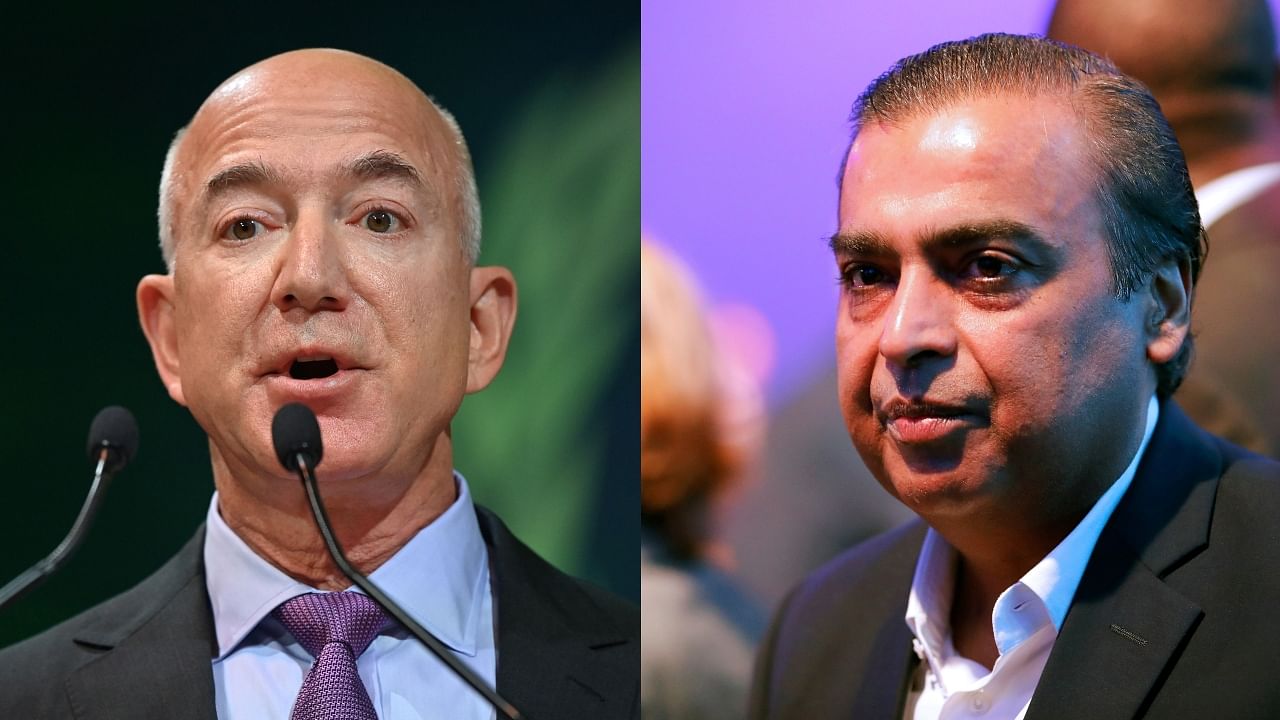
By Andy Mukherjee,
Two of the world’s richest men, fighting over a near-bankrupt Indian retailer, have made so much noise that its board has woken up super cranky. In less than a week, the three independent directors of Future Retail Ltd. have shot off two letters to the country’s competition authority, alleging that Amazon.com had deliberately misled the regulator about the true nature of its 2019 investment in a related entity. They want the antitrust watchdog to cancel the transaction.
The 2025 dollar bonds of Future Retail rose a little Monday, though they still trade at 61 cents to the dollar. Based on what an arbitration tribunal in Singapore has had to say on the issue of alleged misrepresentation by Amazon, the maneuvre looks like a long shot. But one never can predict the course of regulatory action in India. If the gambit succeeds, Asia’s wealthiest businessman, Mukesh Ambani, may be able to get his hands on Future’s retail stores after all, a deal Amazon boss Jeff Bezos has so far managed to block using judicial proceedings. A scrapping of Amazon’s investment would leave the US retailer with no valid contract to stop the sale of assets to Ambani.
It’s rare for Indian boards to question the legality of agreements that they’ve been involved in. But then, the stakes are high in the Ambani vs. Bezos battle. The outcome could go some way toward determining which of the two billionaires would ultimately control India’s $800 billion retail market. This isn’t a war the directors can sit out — not with Future sinking under the weight of Rs 19,000 crore of liabilities, and relentless losses that jumped 80 per cent from a year earlier in the six months through September.
The unraveling of Future, a pioneer of modern mass retailing in India with 1,500-plus stores spread across 16 million square feet, began some time ago. The $192 million (Rs 1429 crore) Amazon paid for a 49 per cent interest in founder Kishore Biyani’s Future Coupons Pvt. translated to indirectly owning roughly 10 per cent of the publicly traded Future Retail, at a premium to the prevailing share price. Amazon, which gave the money expressly for Coupons to invest in the debt-laden Retail, insisted on a list of restricted parties to whom the physical stores couldn’t be sold without the e-commerce giant’s go-ahead. Ambani’s name was on the list, and that’s why Bezos initiated arbitration proceedings for breach of contract when Future brought in India’s No. 1 retail tycoon for a fresh $3.4 billion (over Rs 25,000 crore) rescue after it was hit hard by last year's pandemic.
But now the directors are crying foul, claiming that while they did know about the restricted list, they weren’t aware that Amazon’s small stake in Future had effectively put it in control. That, they say, would be a violation of India’s 2018 foreign investment law forbidding an e-commerce marketplace from investing in a firm that also sells stuff on its platform. “We didn't realize that it was actually Amazon which was driving Future Retail,” independent director Ravindra Dhariwal told BloombergQuint. “We were misled by Amazon, we were blinded to commit an illegal act.”
An Amazon spokesperson refused to comment, though it’s not quite clear how the Seattle-based firm could have misled Future Retail’s board, which received advice from its own lawyers. It’s also not immediately obvious if the directors’ letter reveals something entirely new. In its partial award last month, the Singapore arbitration tribunal dealt with the issue of alleged misrepresentation by Amazon at length. Amazon “had not hid its interest in Future Retail” from the Indian competition authority, the panel said, adding that the “negative, protective, special and material rights” that would accrue to Amazon were disclosed, as well as the fact that the proposed combination also included Future Retail.
Although Ambani’s Reliance Retail Ventures Ltd. has extended the deadline to complete the long-pending acquisition to March 2022, the window to save the deal is closing. The Singapore tribunal has ruled that the Indian retailer is a party to the shareholders’ agreement between Amazon and Future Coupons even though it is not itself a signatory. At the same time, a pandemic-related moratorium on its loan repayments ended in September. Payments to banks will start coming due from January.
As the directors shared their second plea to the antitrust watchdog with the stock exchanges on Sunday, they also signed off on the company’s half-yearly financial results. They look awful. The $147 million (nearly Rs 1,100 crore) equity cushion that existed in March has vanished. Its place on the balance sheet has been taken by a $164 million hole. No wonder the board is suddenly very awake and hyperactive.
Check out latest DH videos here